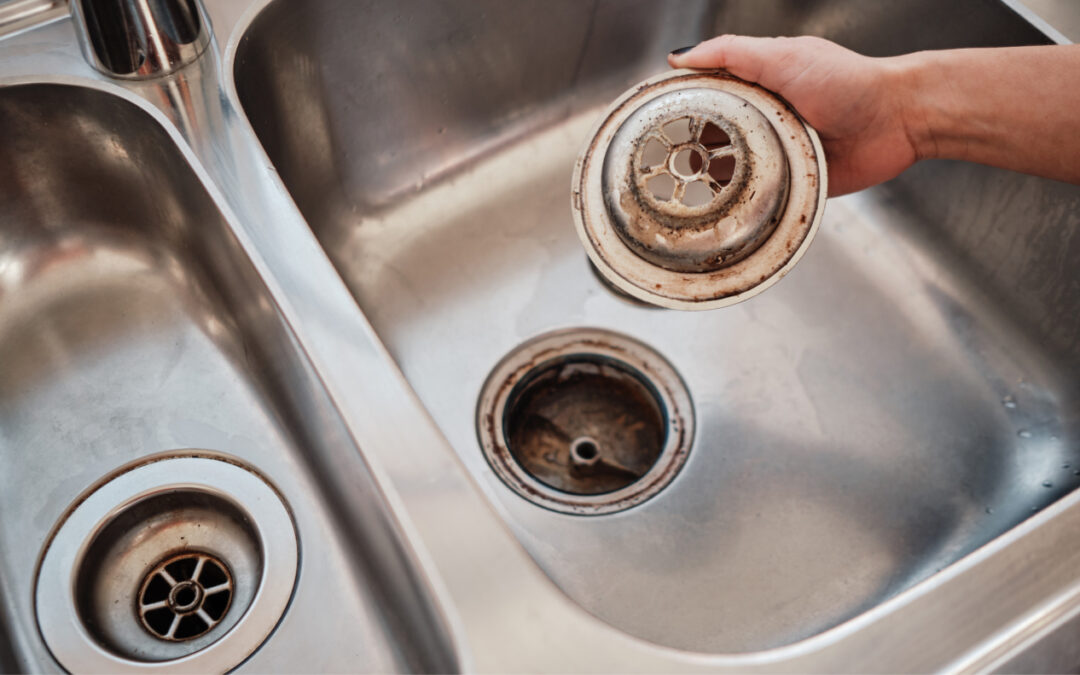Have you ever found yourself staring at a slow-draining kitchen sink, wondering if a quick fix like drain cleaner could solve the problem? You’re not alone.
Many people face this dilemma and wonder if it’s safe or effective to pour that powerful solution down their kitchen pipes. You might think it’s the fastest way to clear the clog, but what about the potential risks? Could you be doing more harm than good?
Before you reach for that bottle, it’s important to understand how drain cleaners interact with your kitchen plumbing and whether they’re the best choice for you. This article will guide you through the pros and cons, offering insights and alternatives that could save you both time and money. Curious to find out more? Read on to discover how to keep your kitchen sink running smoothly without damaging your pipes or creating more problems down the line.
:max_bytes(150000):strip_icc()/how-to-unclog-a-kitchen-sink-2718799_sketch_FINAL-6d86f43bcb464f8ca5b61f240c2d8bf9.png)
Credit: www.thespruce.com
Drain Cleaner Basics
Clogged kitchen sinks are common problems. Food particles and grease often cause blockages. Drain cleaners are solutions designed to clear these clogs. They dissolve or break down the materials blocking the pipes. Understanding the basics helps choose the right type.
Types Of Drain Cleaners
There are three main types of drain cleaners. Chemical, enzymatic, and mechanical. Chemical cleaners use strong ingredients to dissolve clogs. They work fast but can be harsh. Enzymatic cleaners use natural enzymes. They break down organic matter gradually. Mechanical cleaners involve tools like plungers or snakes. They manually remove blockages.
Common Ingredients
Drain cleaners often contain specific active ingredients. Chemical cleaners may have sodium hydroxide or sulfuric acid. These substances are effective but need caution. Enzymatic cleaners usually contain natural bacteria or enzymes. They are safer for pipes and the environment. Knowing these ingredients helps make informed choices for your kitchen sink.

Credit: www.liquidplumr.com
Pros Of Using Drain Cleaner
Drain cleaners can offer significant advantages for kitchen sinks. These products are widely used for their effectiveness. They help in quickly clearing blocked pipes. Many homeowners rely on them for this reason. Below are some pros to consider.
Quick Solution
Drain cleaners provide a fast way to remove clogs. They work in minutes. This quick action is ideal for busy households. No need to wait for a plumber. Your sink is back in service swiftly.
Ease Of Use
Using a drain cleaner is simple. Just follow the instructions on the label. Most products require only pouring and waiting. No special tools are needed. This makes it accessible for everyone.
Cons Of Using Drain Cleaner
Using drain cleaner in your kitchen sink might seem like a quick fix for clogs, but there are significant drawbacks you should consider. These powerful chemicals can cause more harm than good, impacting your plumbing, the environment, and even your health. Before you reach for that bottle, weigh these cons carefully.
Potential Damage To Pipes
Drain cleaners are often highly corrosive. This means they can eat away at your pipes over time. If your plumbing is older or made of weaker materials like PVC, the risk is even higher. Regular use can lead to leaks, and eventually, you might face costly repairs or replacements. Have you checked what material your pipes are made of?
Environmental Impact
When you pour drain cleaner down the sink, it eventually ends up in the water supply. These chemicals are tough to break down, contributing to pollution in rivers and oceans. They can harm aquatic life, disrupting ecosystems. Consider the footprint you’re leaving behind every time you clear a clog.
Health Risks
The fumes from drain cleaners can be harmful. Inhaling them can irritate your respiratory system, causing coughing or difficulty breathing. If you accidentally splash it on your skin, it can cause burns or irritation. Is a quick fix worth risking your health or that of your family?
Using drain cleaner might clear a blockage, but the risks can outweigh the benefits. Consider alternative solutions like using a plunger or baking soda and vinegar. Next time you face a stubborn clog, think twice before reaching for that chemical cleaner. What safer methods have you tried that worked well?
Alternative Solutions
Thinking about using drain cleaner in your kitchen sink? Consider alternative solutions like baking soda and vinegar. These natural options can effectively clear clogs without harsh chemicals, ensuring a safer environment for your home.
Alternative solutions to using drain cleaner in the kitchen sink offer safer options. They are eco-friendly and can protect your plumbing system. Explore these methods to maintain a clean and efficient kitchen sink.Natural Remedies
Natural remedies help clear sink clogs without harsh chemicals. Baking soda and vinegar create a powerful mixture. Pour half a cup of baking soda into the drain. Follow it with a cup of vinegar. Wait for the fizzing to stop. Then, flush with hot water. Salt and boiling water can also dissolve minor clogs. Pour a cup of salt into the drain. Follow it with boiling water. This method helps remove grease build-up. Lemon juice is another effective natural cleaner. Its acidity breaks down grime. Mix lemon juice with baking soda for a fresh-smelling solution. This keeps your kitchen sink both clean and odor-free.Mechanical Methods
Mechanical methods provide a hands-on way to clear clogs. A plunger is a simple tool that creates pressure. Place it over the drain and push down firmly. Repeat several times to dislodge the blockage. A drain snake is another useful tool. Insert it into the drain and rotate to catch debris. Pull it out slowly to remove the clog. This method is effective for stubborn blockages. Use a wire hanger if you do not have a drain snake. Straighten it and bend one end into a hook. Insert it into the drain to fish out clogs. Be careful not to scratch the sink. These methods can help keep your kitchen sink flowing smoothly.Preventing Clogs
Drain cleaner may help clear kitchen sink clogs but can damage pipes over time. Consider safer alternatives like baking soda and vinegar. Regularly cleaning strainers and avoiding grease disposal reduces clog risk significantly.
Preventing clogs in your kitchen sink is crucial for maintaining a smooth-running household. The frustration of a blocked drain can disrupt your daily routine and lead to costly plumbing repairs. By taking proactive steps, you can keep your kitchen sink free-flowing and avoid the need for harsh chemical drain cleaners.Regular Maintenance
Regular maintenance is key to preventing clogs. Make it a habit to clean your sink drain weekly. Use a mixture of baking soda and vinegar to break down minor buildups. Pour half a cup of baking soda followed by half a cup of vinegar down the drain. Let it fizz for a few minutes, then flush with hot water. Consider using a drain guard or strainer to catch food particles and debris. This simple tool can prevent larger items from slipping into the pipes. Regularly empty the strainer to maintain its effectiveness.Best Practices
Adopting best practices in your kitchen can significantly reduce the risk of clogs. Avoid pouring grease or oil down the sink. These substances can solidify and create stubborn blockages. Instead, collect grease in a container and dispose of it in the trash. Be mindful of what you rinse down the sink. Scrape food scraps into the trash or compost bin before washing dishes. Even small particles can accumulate over time, leading to a clogged drain. Think about how you use your garbage disposal. Run cold water while using it to help flush particles through the system. Avoid overloading the disposal with large amounts of food at once. Have you ever had to deal with a clogged kitchen sink? It’s a hassle, right? By following these simple steps and maintaining a regular cleaning routine, you can keep your kitchen sink clog-free and ensure your daily kitchen tasks run smoothly.
Credit: trusteyman.com
Frequently Asked Questions
Is It Safe To Use Drain Cleaner In The Kitchen Sink?
Using drain cleaner in the kitchen sink can be risky. These chemicals may damage pipes or harm the environment. Always read labels carefully. Consider natural alternatives or consult a plumber for persistent clogs. Regular maintenance can prevent buildup and reduce the need for harsh chemicals.
Can Drain Cleaner Damage Kitchen Sink Pipes?
Yes, drain cleaner can damage kitchen sink pipes. Harsh chemicals might corrode or weaken pipes over time. This can lead to leaks or costly repairs. It’s advisable to use drain cleaner sparingly. Consider using safer, eco-friendly options or consult a professional for stubborn clogs.
Are Natural Alternatives Better For Kitchen Sinks?
Natural alternatives are often better for kitchen sinks. They are safer for pipes and the environment. Ingredients like baking soda and vinegar can effectively clear minor clogs. Regular use can help maintain clear drains. They are a cost-effective and eco-friendly solution for kitchen sink maintenance.
How Often Should I Clean My Kitchen Sink Drain?
You should clean your kitchen sink drain regularly. Cleaning once a month can prevent clogs and bad odors. Use natural methods like baking soda and vinegar. Regular cleaning ensures smooth drainage and reduces the need for harsh chemicals. Consistent maintenance keeps your kitchen sink in good condition.
Conclusion
Using drain cleaner in your kitchen sink can be risky. It may harm pipes or cause damage. Instead, try natural methods like baking soda and vinegar. These are safe and effective. Regular cleaning can also prevent clogs. If problems persist, consider calling a professional plumber.
They can assess and fix issues safely. Always prioritize safety over quick fixes. Your kitchen is a vital part of your home. Keep it functioning well with careful maintenance. Avoid shortcuts that might lead to bigger problems. Choose safe solutions for a clean, efficient kitchen sink.

As the chief content writer, Hassan Al Sarker works as a professional kitchen-based content creator at Kitchen Liker.
In addition to reviewing the content published on Kitchen Liker, he ensures that it is accurate, relevant, and helpful. As a result, all the reviews and information published at Kitchen Liker are neutral and userfriendly.
Hassan Al Sarker has a bachelor’s degree in Hotel and Tourism Management From the Newyork University. Before joining Kitchen Liker, he was a contributor at Kitchen Club, United States.

